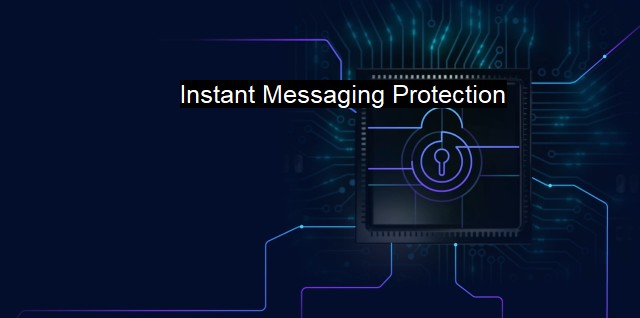What is Instant Messaging Protection?
The Importance of Instant Messaging Protection: Safeguarding Sensitive Data and Preventing Cyber attacks
Instant Messaging (IM) has become an integral part of online communication in today's digital era. It's not just used on a personal level anymore but has also become crucial to businesses worldwide, providing immediate and efficient response mechanisms in customer service and internal cooperation. Despite the many benefits it brings, instant messaging also poses significant risks. It serves as a conduit for different types of cyber threats like malware, phishing, and hacking attacks. This is where Instant Messaging Protection comes into play.Instant Messaging Protection is a suite of security measures designed to safeguard internet users from cyber threats associated with instant messaging. it imparts security not just by fending off potential intruders and preventing the exploitation of vulnerabilities but also by reinforcing the resilience of the Information technology (IT) infrastructure used in accessing such platforms.
Several IM applications lack consolidated security measures, rendering them vulnerable to sleuths ofordid intentions. Cybercriminals oftentimes target IM applications to transmit perilous payloads, which can compromise the safety and integrity of a computer system or network. The most notorious type of these payloads is malware, which includes viruses, worms, trojans, and ransomware. These malicious programs can lead to unbeknownst data theft, unauthorized access, and even damage to the computer system or network being run.
Phishing is another common cyber threat that takes advantage of the ease and speed of instant messaging. Potential victims are sent seemingly harmless links or attachments in an IM. Upon clicking the link or opening the attachment, sensitive information can be stolen, or rogue software can be installed in their device. Instant messaging protection servesto hinder such activities and safeguard user information.
These reiterated dangers necessitate the importance of instant messaging protection in any online environment. Several methods can be deployed for this purpose.
One approach is utilizing specifically designed security software. These generally function by scanning data that is being transferred over the network, identifying potential threats, and arresting them before they impact the system. Some antivirus solutions offer IM protection as a supplementary feature, while others have specific IM security programs designed to offer in-depth defense against such threats logout automation after a certain period, restrictions on file transfers, and scanning of shared URLs.
A complementary practice should be crafting and implementing strict corporate policies regarding instant messaging usage and carefully imparting them to staff to raise awareness about possible threats and their countermeasures. Acceptable use, confidentiality, and conduct policies should determine the rules for using IM apps. Employees should be trained to scrutinize received messages, links, and attachments, proceed cautiously when dealing with unknown senders, and avoid sharing sensitive data through IM.
It is worth highlighting that Instant messaging protection does not simply mean installing an antivirus program and hoping that it will mitigate all dangers, but rather involves an orchestrated symbiosis of technical software protection mechanisms, meticulous administrative controls, and consistent user restraint and awareness.
On the final note, Instant Messaging Protection emphasizes the need for constant vigilance and proactive defense measures, reflecting the evolving cybersecurity landscape. It ensures secure communication across networks, allowing individuals and businesses to leverage the benefits of instant messaging without falling prey to the potential perils. The role of Instant Messaging Protection therefore extends beyond preserving data or device security, it contributes to maintaining business continuity, reputation, and the reliability of the vastly expansive and intricate digital ecosystem at large.

Instant Messaging Protection FAQs
What is instant messaging protection?
Instant messaging protection refers to the measures put in place to secure instant messaging applications against cyber threats such as hacking, malware, and phishing attacks.What are the common threats to instant messaging applications?
The common threats to instant messaging applications include malware, phishing attacks, hacking, data leakage, and social engineering attacks.What measures can be put in place to protect instant messaging applications?
Some of the measures that can be put in place to protect instant messaging applications include installing antivirus software, using strong passwords, enabling two-factor authentication, avoiding clicking on suspicious links, and keeping software up-to-date.How important is instant messaging protection for businesses?
Instant messaging protection is crucial for businesses because cyber-attacks can lead to significant financial losses, reputation damage, and loss of customer trust. By securing instant messaging applications, businesses can protect their confidential information, maintain customer trust, and safeguard their reputation.| | A | | | B | | | C | | | D | | | E | | | F | | | G | | | H | | | I | | | J | | | K | | | L | | | M | |
| | N | | | O | | | P | | | Q | | | R | | | S | | | T | | | U | | | V | | | W | | | X | | | Y | | | Z | |
| | 1 | | | 2 | | | 3 | | | 4 | | | 7 | | | 8 | | |||||||